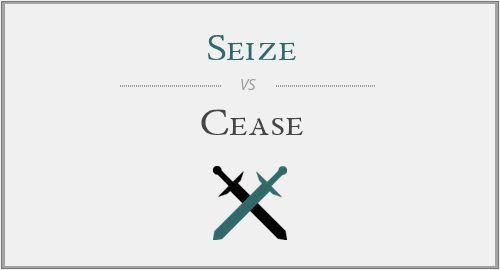Does the above sentence makes sense to you? It uses two homophones i.e. a pair or words that have same pronunciation but different meanings and spellings. Cease and seize sound the same but their meaning are entirely different. In this article we will help you understand both the meaning and usage of this pair of homophones so you don’t confuse one for the other.
Seize as verb:
Taking hold of something suddenly and forcefully is called seizing it. She jumped and seized his arm. When someone take forcible possession of something it is also termed as seize. The army rebels seized the enemy’s air base. When a police or some other authoritative official take possession of something by their legal right or through a warrant, they seize it. The cop seized the all the weed in his car. When someone grabs an opportunity eagerly, he/she is seizing it. He seized his chance of promotion while the other candidate was slacking. The sudden or acute feeing of pain or fear is also called seize. Ana was seized by the most dreadful fear that her plane will crash. When something appeals or attracts others’ attention, it seizes them.
The quick and clear understanding of something is also known as seize. He always strains to seize the most somber truths. The person’s full awareness of a situation is also seize. The judge was fully seized of the point. When a moving part of a machine is jammed, it seizes.
Cease as verb:
When something is brought to an end comes to an end itself, it is said to be ceased. Used alternatively with halt, stop, terminate, wind up and be over etc. cease originated from Latin cedere ‘to yeild’.
Examples of Cease:
It will never cease to amaze me how much work Bill gets done in a day.
You must cease your derelict activities or you will get arrested one of these days.
Because of copyright infringement, the company instructed them to cease and desist all business activities.

Examples of Seize:
If you don’t pay your mortgage, the bank will seize all of your assets.
The police officer had a warrant to seize the criminal’s vehicle.
He had to seize the opportunity to compete in the Olympics because it would be his last chance to win a gold medal.
Seize vs. cease:
Seize is the forcible control over something be it an object or a territory. Cease, however is the stopping or termination of a particular thing that was in action before. Cease and seize cannot be used interchangeably as their meaning are very different from each other regardless of their pronunciation (which is exactly alike).
It’s time to cease the sluggish attitude and seize control of your writings.




Have a discussion about this article with the community:
Report Comment
We're doing our best to make sure our content is useful, accurate and safe.
If by any chance you spot an inappropriate comment while navigating through our website please use this form to let us know, and we'll take care of it shortly.
Attachment
You need to be logged in to favorite.
Log In